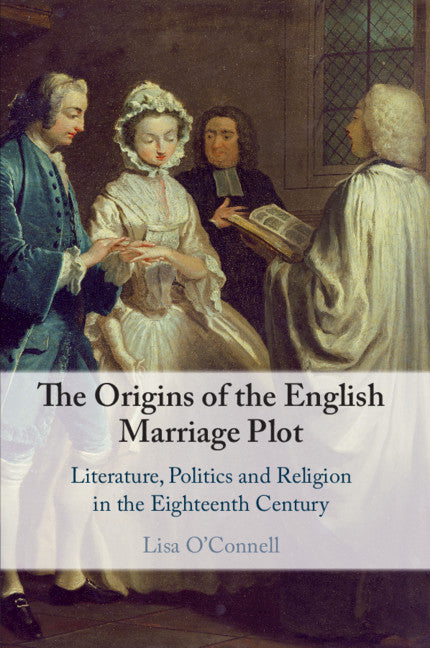Freshly Printed - allow 8 days lead
Couldn't load pickup availability
The Origins of the English Marriage Plot
Literature, Politics and Religion in the Eighteenth Century
Examines how and why marriage plots became the English novel's most popular form in the eighteenth century.
Lisa O'Connell (Author)
9781108707459, Cambridge University Press
Paperback / softback, published 18 March 2021
320 pages, 5 b/w illus.
22.8 x 15.2 x 1.7 cm, 0.476 kg
'The Origins of the English Marriage Plot['s] … interest lies not merely in the relationship between law and literature, but also in that between church and state. [It] convincingly argues that 'precisely as a statutory law mandating a religious rite, the Marriage Act realigned English marriage law's relation to church and state' (7). As such it laid the necessary groundwork for the more radical changes of the nineteenth century, even if disputes as to whether marriage is a matter that should be governed by the state continue to this day. O'Connell is particularly strong on the relationship between church and state in the mid-eighteenth century and on the debates about natural law. In foregrounding the role of the church, she shows how clergy were also central to the marriage plot.' Rebecca Probert, Eighteenth-Century Studies
Why did marriage become central to the English novel in the eighteenth century? As clandestine weddings and the unruly culture that surrounded them began to threaten power and property, questions about where and how to marry became urgent matters of public debate. In 1753, in an unprecedented and controversial use of state power, Lord Chancellor Hardwicke mandated Anglican church weddings as marriage's only legal form. Resistance to his Marriage Act would fuel a new kind of realist marriage plot in England and help to produce political radicalism as we know it. Focussing on how major authors from Samuel Richardson to Jane Austen made church weddings a lynchpin of their fiction, The Origins of the English Marriage Plot offers a truly innovative account of the rise of the novel by telling the story of the English marriage plot's engagement with the most compelling political and social questions of its time.
Introduction: historicising the English marriage plot
1. Church, state and the public politics of marriage
2. Clandestine marriage, commerce and the theatre
3. The new fiction: Samuel Richardson and the Anglican wedding
4. The Patriot Marriage plot: fielding, Shebbeare and Goldsmith
5. Literary marriage plots: Burney, Austen and Gretna Green
Afterword.
Subject Areas: Feminism & feminist theory [JFFK], Literary studies: c 1500 to c 1800 [DSBD], Literature & literary studies [D]


